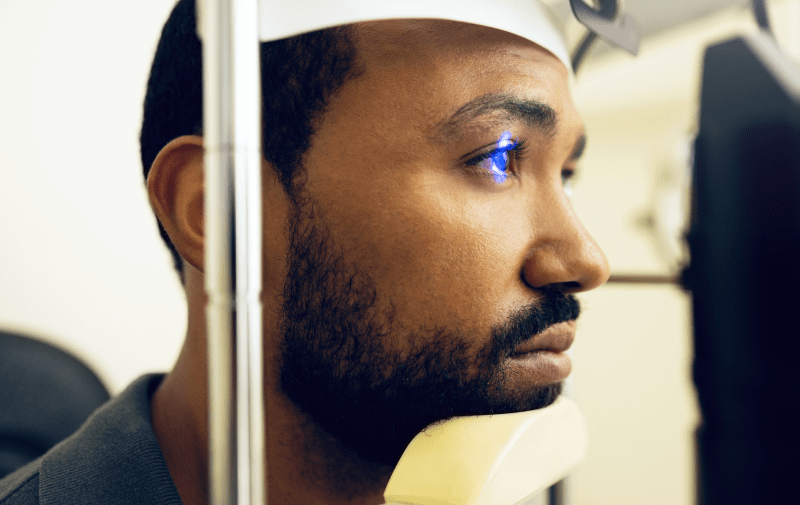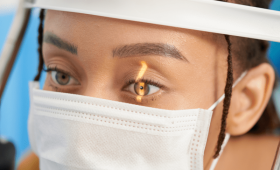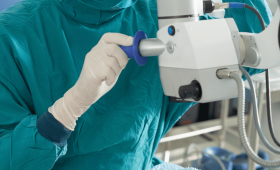What Is Myopia And How Does It Arise?
Myopia is a condition where light rays, instead of falling precisely onto the retina, fall in front of it, resulting in blurred distance vision. This condition develops due to the eyeball being longer than normal (axial myopia) or the refractive power of the cornea and lens being excessively strong (refractive myopia). It usually emerges during childhood and adolescence, and the eye prescription may increase until progression stops. The goal of treatment is to refocus the light rays onto the retina and permanently restore the patient’s clear vision ability.
What Are The Most Common Symptoms Of Myopia?
The most common symptom of myopia is inability to clearly see distant objects, traffic signs, or writing. In children, this often manifests as difficulty reading the blackboard or the desire to sit close to the television. In adults, difficulty driving at night, squinting, and chronic headaches may signal the presence of myopia. Since these symptoms decrease the quality of daily life, patients should seek permanent solutions and undergo regular eye examinations for early diagnosis.
Why Does Myopia Usually Start In Childhood?
Myopia begins during preschool and school age (6-18 years), the period when the eyeball grows rapidly. During this time, the eye may elongate more than normal due to genetic predisposition and environmental factors such as intense near work (screens, reading books). The progression of myopia usually continues until late adolescence, leading to an increase in prescription. Since early-onset and rapidly progressing myopia carry the risk of high myopia, treatments aimed at slowing progression (Atropine drops, special lenses) are highly important during this period.
Is Myopia A Progressive Disease?
Myopia is progressive, especially during adolescence; meaning the eye prescription increases. The eye prescription is generally expected to stabilize between the ages of 18 and 21. However, in some rare cases, myopia may continue to progress at a low rate even in adulthood. While laser surgery or lens treatments applied after myopia stabilizes yield permanent results, the priority in progressive myopia is to stop the progression. Specialists in Turkey require the prescription to remain stable for at least one year before laser treatment.
What Risks Does A High Degree Of Myopia Carry?
High myopia (usually greater than -6.00 diopters) significantly increases the risk of serious eye diseases such as retinal detachment, glaucoma, and cataracts due to the excessive elongation of the eyeball. As the eye stretches, the tissues that nourish the retina become strained and more prone to tears. Therefore, for patients with high myopia, regular retinal examinations are crucial, in addition to correcting the refractive error. Laser surgery does not reduce these risks but improves visual acuity, thus enhancing the quality of life.
What Methods Are Used In Myopia Treatment Other Than Glasses And Lenses?
Glasses and contact lenses in myopia treatment are only temporary solutions that correct the symptoms. The most common permanent solutions are laser surgeries that reshape the cornea, such as LASIK, Femto-LASIK, and PRK. For patients with very high myopia prescriptions or thin corneas, lens treatments like ICL (Implantable Collamer Lens) implantation are applied. Modern clinics in Turkey determine the most suitable surgical method based on the patient’s corneal thickness and age.
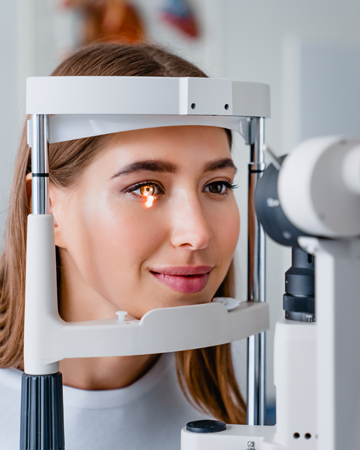
Can Myopia Be Completely Corrected With LASIK Eye Surgery?
Yes, myopia can be largely and permanently corrected with LASIK eye surgery, provided suitable corneal thickness and stable eye prescription conditions are met. The goal of the surgery is to enable the patient to achieve clear, glasses-free vision. Over 98% of patients achieve the expected visual acuity after a successful surgery. However, the emergence of difficulty with near vision (presbyopia), which may occur after the age of 40, does not mean the surgery has failed; it is the natural aging process of the eye and may require an additional lens solution if necessary.
What Should The Myopia Prescription Be For LASIK Surgery?
While there is no definitive upper limit for the myopia prescription for LASIK surgery, it can generally be successfully applied up to -10.00 diopters. However, the decisive factor is corneal thickness. Since correcting high prescriptions requires removing more corneal tissue, alternatives like PRK or ICL may be recommended instead of LASIK even at lower prescriptions for patients with thin corneas. Specialists in Turkey make the final decision based on detailed corneal mapping (topography) results.
What Are The Advantages Of Femto-LASIK Technology In Myopia Treatment?
Femto-LASIK (bladeless laser) technology offers significant advantages over traditional LASIK. In this method, the flap on the cornea is created with a Femtosecond laser instead of a mechanical blade. This ensures the flap is thinner, more regular, and more precise, which minimizes the risk of dry eyes and flap complications after surgery. Most leading eye centers in Turkey use this advanced technology as a standard because it offers safer and faster recovery.
Why Should Turkey Be Preferred For Getting Rid Of Glasses?
Turkey is the most logical choice for patients who want to get rid of glasses due to its cost advantage of up to 50-70%, hospitals with international accreditations, and expert surgeons with high case experience. Despite using the same quality and latest technology laser devices (Femto-LASIK, Wavefront), costs are quite low due to low operational expenses. The inclusion of all logistical processes (transfer, accommodation) except the flight ticket through professional institutions like Cure Holiday ensures the patient has a stress-free treatment process. This confidently directs patients to receive treatment in Turkey.
What Is The Average Cost Of Myopia Laser Treatment In Turkey?
The average cost of myopia laser treatment (Femto-LASIK) in Turkey is one-third to one-half the price in European countries. Prices vary according to the type of laser applied (Femto-LASIK is more expensive), the scope of the package (accommodation, transfer included), and the city where the clinic is located. However, this cost allows patients to receive high-quality laser surgery without stretching their budget. You can contact Cure Holiday to find the most suitable, transparently priced, and all-inclusive treatment packages for your budget, thereby deciding to receive treatment in Turkey.
What Detailed Eye Tests Are Performed Before Surgery?
Before laser surgery, detailed eye tests of critical importance are performed for the safety and success of the treatment. These tests include corneal thickness measurement (pachymetry), corneal mapping (topography), eye pressure measurement, eye prescription measurement, and fundus examination. Corneal mapping, in particular, plays a vital role in determining the area and depth of laser application. The fee for these comprehensive tests is usually included in the laser package price by reliable clinics.
How Does Corneal Thickness Affect The Success Of Myopia Treatment?
Corneal thickness is the most important factor determining the success and safety of myopia laser treatment (LASIK). Tissue must be removed from the cornea to correct the eye prescription; the cornea must not fall below a certain thickness after surgery to maintain sufficient strength. In patients with thin corneas, the risk of corneal stability disruption (developing keratoconus) after laser increases. In this case, specialists resort to alternative methods like PRK or ICL that remove less tissue.
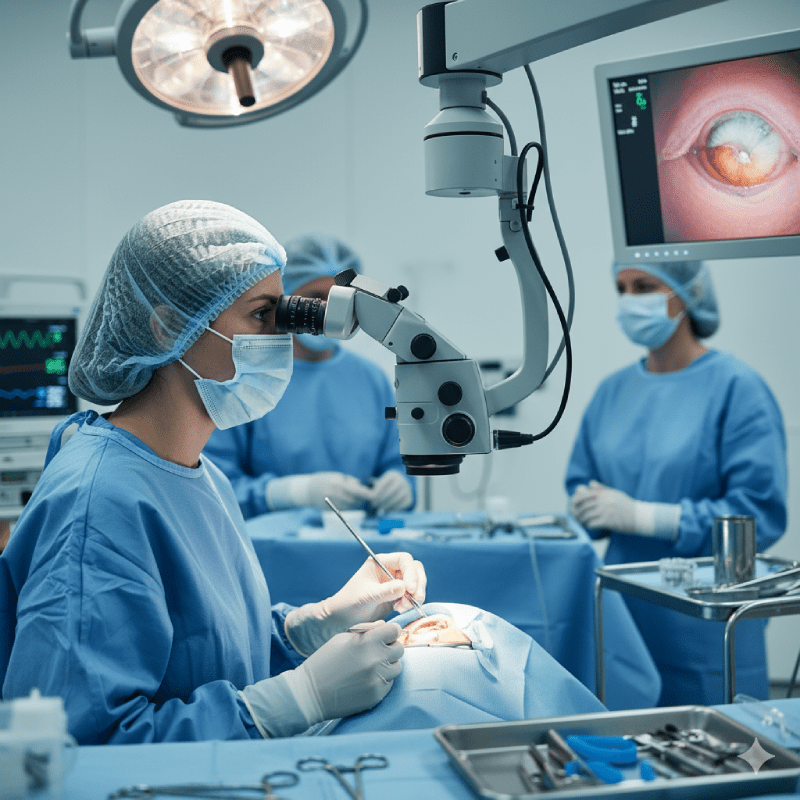
How Long Should Lens Use Be Stopped Before Surgery?
Before laser surgery, contact lens use must be stopped because contact lenses change the natural shape of the cornea. Patients using soft lenses must stop using them at least 1 week prior, and those using hard lenses must stop using them 2 to 4 weeks prior. This period is critical for the cornea to return to its original shape, allowing accurate and correct pre-operative measurements. Incorrect measurements can lead to incorrect laser planning and thus failure.
Is LASIK Surgery A Painful Procedure?
No, LASIK surgery is a completely painless procedure thanks to the eyes being brought under local anesthesia with numbing drops. During the surgery, the patient only notices the light of the laser device and may feel slight pressure on the eye. Mild stinging or watering may occur in the first few hours post-surgery, but this condition is easily controlled with prescribed painkillers and protective drops and usually disappears within a few hours.
When Is Visual Acuity Achieved After Surgery?
After LASIK surgery, patients achieve significantly improved visual acuity even at the first check-up performed the next day. Vision rapidly begins to clear from the first day, and patients can return to their daily activities. Achieving full and final visual acuity and complete eye adaptation may take a few weeks to a month. This rapid recovery process allows patients who decide to receive treatment in Turkey to quickly return to their work or social lives.
What Is The Risk Of Dry Eyes After Myopia Treatment?
Temporary dry eyes are a risk present after laser surgery; this condition stems from the temporary effect on corneal nerves during the surgery. However, modern methods like Femto-LASIK have significantly reduced this risk and severity compared to traditional methods. Physicians prescribe intensive moisturizing (artificial tear) drops to patients to manage this temporary condition. Dry eyes usually resolve completely within a few months.
How Is ICL Lens Treatment An Alternative For High Myopia?
ICL (Implantable Collamer Lens) treatment is an ideal alternative for high myopia patients with very thin corneas or prescriptions exceeding safe laser limits (e.g., above -10.00). In this method, the eye’s natural lens is preserved, and a permanent contact lens is implanted inside the eye. Since ICL does not remove corneal tissue, it provides high-quality vision to patients for whom LASIK is not applicable. These advanced technology solutions are successfully applied in expert eye centers in Turkey.
What Is Included In Laser Treatment Packages In Turkey?
Laser surgery packages in Turkey generally include the surgery itself (Femto-LASIK), comprehensive pre-operative tests, all necessary post-operative drops and medications, and VIP airport transfers for international patients. Accommodation is also usually part of the package or can be added for an extra fee. These transparent packages offered through Cure Holiday secure the patient’s budget, allowing them to focus on their treatment without stress in Turkey.
How Many Days Of Accommodation Is Required In Turkey For Treatment?
Patients coming to Turkey for myopia laser surgery are recommended to plan for an average stay of 3 to 4 days for a safe recovery process and mandatory check-ups. This period is sufficient for detailed pre-operative tests, the surgery day, and the mandatory first post-operative check-up. The first-day check-up is vital for the surgeon to check the position of the flap and the initial visual acuity. This short accommodation period makes the decision to receive treatment in Turkey easier.
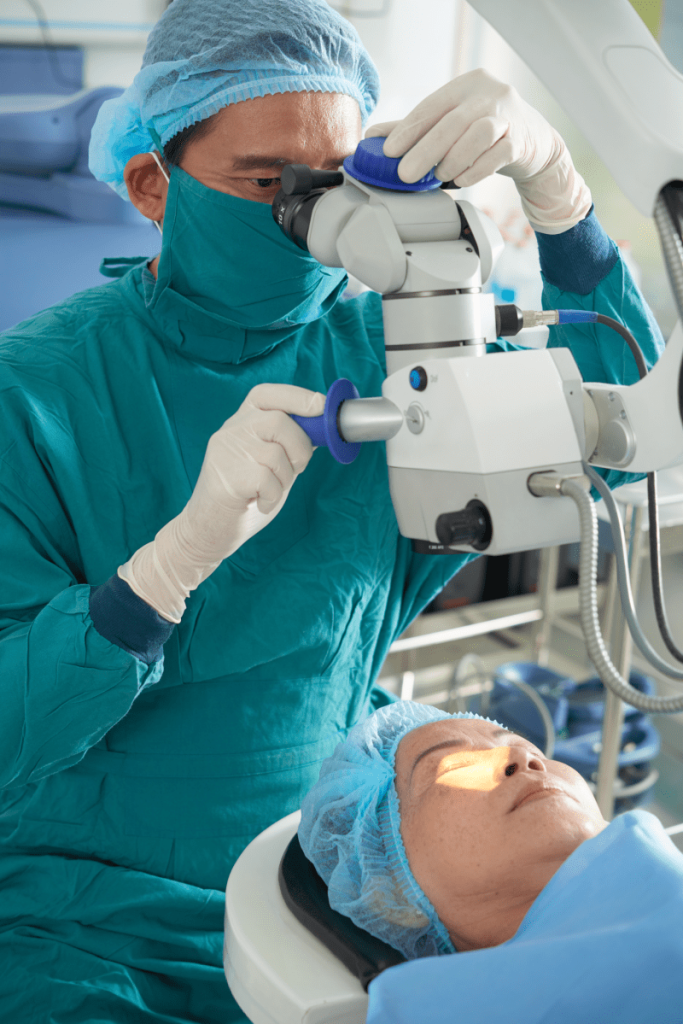
What Should Be Done And Avoided On The First Day After Surgery?
On the first day after surgery, it is vital for the patient to rest absolutely and strictly avoid rubbing their eyes or contacting them with water. The protective glasses or shield recommended by the surgeon should be worn. Eye drops must be used regularly to prevent infection and accelerate healing. Heavy physical activities and intense light exposure must be avoided. This first 24 hours is the most critical phase for the flap to settle, and adherence to these rules guarantees success.
Will Eye Prescription Recur After Myopia Treatment?
After a successful LASIK surgery, if the patient’s eye prescription was stable (unchanged for at least one year), the risk of recurrence (regression) is very low. If a small regression rarely occurs, this condition is usually corrected with a free Touch-Up laser intervention within one year. The important thing is that the surgery permanently corrects the existing myopia; near vision difficulty after the age of 40 is a natural aging process and does not mean the surgery has failed.
What Is The Success Rate In High Myopia Prescriptions?
The success rate in high myopia prescriptions (e.g., above -8.00) remains high when appropriate corneal thickness and the correct laser technology (Femto-LASIK/Wavefront) are used. However, the risk of a small prescription remaining may increase at these prescriptions, and this condition is usually corrected with a free touch-up. If corneal thickness is insufficient at very high prescriptions, ICL lens implantation, which has a higher success rate and is safer, is recommended. Specialists in Turkey have superior experience in high myopia cases.
Will Night Vision Problems Increase After Laser Surgery?
Some patients may experience temporary reduced night vision, halos, or glare after laser surgery. This condition was more common, especially with traditional LASIK. Modern Femto-LASIK and Wavefront technologies have significantly minimized this risk. These effects usually decrease and disappear as the eye adapts to its new corneal shape within a few weeks to a few months. Wavefront technology, which optimizes night vision quality, is recommended for patients who decide to receive treatment in Turkey.
Is The Use Of Sunglasses Mandatory After Surgery?
The use of sunglasses (UV protected) is absolutely mandatory after surgery, especially for the first month. Glasses protect the eyes from UV rays, dust, and wind. Since the cornea is sensitive to UV light during the healing process, failure to protect it may lead to slower healing or, rarely, permanent scarring. Wearing a protective shield on the first night also prevents flap slippage.
Is Laser Treatment A Permanent Solution For Myopia?
Yes, laser treatment (LASIK, PRK) applied for myopia permanently corrects the shape of the cornea, eliminating the need for glasses. The effect of the treatment lasts for a lifetime, but difficulty with near vision (presbyopia) that may occur after the age of 40 does not mean the laser has failed. This is caused by the aging of the eye’s natural lens and is independent of myopia correction. The laser is a permanent solution for the existing refractive error.
What Conditions Make Laser Treatment Inapplicable?
Laser treatment cannot be applied to people with very thin corneas, corneal diseases like keratoconus, uncontrolled diabetes, pregnant or nursing women, or young people under 18 whose eye prescription is still changing (unstable). Furthermore, it may be risky for patients with severe dry eyes or progressive eye diseases like glaucoma. Specialists in Turkey detect these risk factors through detailed tests and offer alternative solutions like ICL lens to unsuitable patients.
What Methods Are Used To Stop The Progression Of Myopia
Methods like low-dose Atropine eye drops and specially designed myopia control contact lenses (MiSight, Ortho-K) are currently used to slow down or stop the progression of myopia, especially in childhood. These treatments aim to reduce the risk of high myopia by slowing down the elongation of the eye. While laser surgery corrects myopia, it does not stop the progression; therefore, these control methods are critical until the age of stabilization.
How Long Are Eye Makeup And Eye Rubbing Forbidden After Surgery?
To minimize the risk of infection after surgery and ensure the corneal flap settles completely, eye rubbing is generally forbidden for 1 month. Eye makeup (mascara, eyeliner, shadow) is also forbidden for at least 1 week (preferably 2 weeks) to prevent makeup residue from getting under the flap. Strict adherence to these rules is mandatory for the surgery to be complication-free and successful.
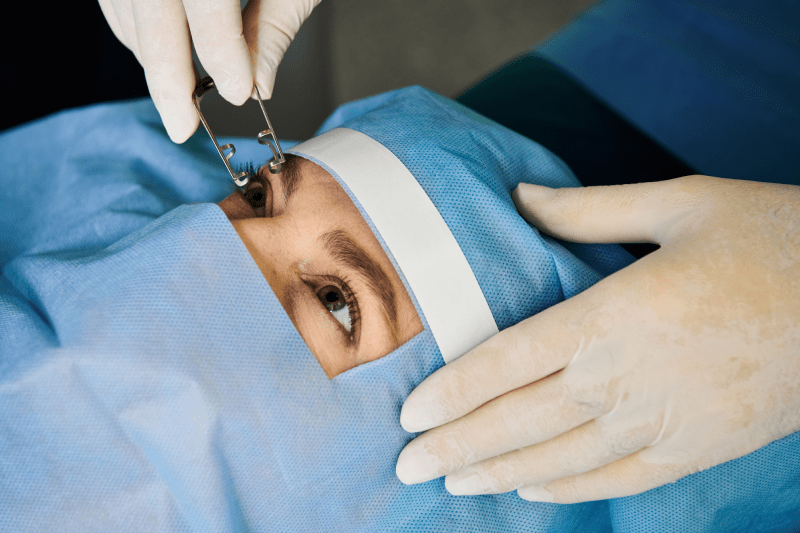
What Is The Guarantee That Laser Surgery Prices In Turkey Are Attractive?
The guarantee that laser surgery prices in Turkey are attractive is that quality is not compromised. The price advantage stems from low personnel and operational costs and the high foreign exchange rate advantage. Clinics have JCI (Joint Commission International) accreditations and use the latest technology laser devices. This guarantees that, despite the low cost, the quality is at international standards. Deciding to receive treatment in Turkey is the smart way to preserve your budget while getting the best technology.
What Is Cure Holiday’s Role In Eye Health Tourism?
Cure Holiday acts as a bridge of trust and organization for patients in myopia laser surgery. It selects the best JCI-accredited eye centers and expert surgeons suitable for the patients’ budgets and eye structures. It organizes all logistical processes (VIP transfer, luxury accommodation) and provides uninterrupted interpreter support during the surgery. This allows the patient to focus on treatment without travel and organization stress.
Are Long-Term Check-Ups Charged In Turkey?
Long-term check-up appointments (usually 6 months/1 year) are important for the continuation of treatment success. Reliable clinics generally offer these periodic check-ups free of charge for one year. The patient is only obligated to cover the travel expenses (airfare) required for these controls. This free check-up guarantee ensures the patient’s long-term safety. Cure Holiday also assists patients in coordinating follow-ups with doctors in their home country.
How Are Chronic Diseases Managed Before Surgery?
It is absolutely mandatory to control chronic diseases like diabetes before laser surgery. Uncontrolled diabetes slows down wound healing and increases the risk of infection. Physicians control the patient’s blood values (especially HbA1c) before the surgery and may postpone the surgery until these values are within acceptable limits. This precaution is taken to maximize the safety and success of the surgery.
What Is The Most Suitable Age Range For Surgery?
The most suitable age range for myopia laser surgery is between 20 and 40, where the eye prescription is stable. Surgery is generally not performed on patients under 18 due to the risk of prescription change. After the age of 40, patients may be directed to monovision or trifocal/EDOF lens treatments due to the onset of presbyopia.
Is Long-Term Computer Use A Problem After LASIK Treatment?
After the surgery, long-term computer use does not cause a problem, but it may trigger dry eyes. Physicians recommend taking frequent breaks, blinking regularly, and using moisturizing drops to prevent dry eyes. These precautions support the eye’s recovery process and minimize discomfort arising from dry eyes.
How Is The Complication Risk Of Laser Surgery Minimized?
The complication risk of laser surgery is minimized by choosing an expert surgeon with high case experience and using advanced technology like Femto-LASIK. Detailed pre-operative corneal mapping and the use of sterile operating room conditions are also key factors. Adherence to post-operative instructions by the patient is mandatory to prevent risks like flap slippage or infection.
Are The International Accreditations Of Clinics In Turkey Reliable?
The international accreditation certificates (JCI) of leading eye clinics in Turkey confirm that the clinics meet the highest global standards in device quality, hygiene protocols, and patient safety. These accreditations are the most concrete proof of quality for international patients who decide to receive treatment in Turkey.
